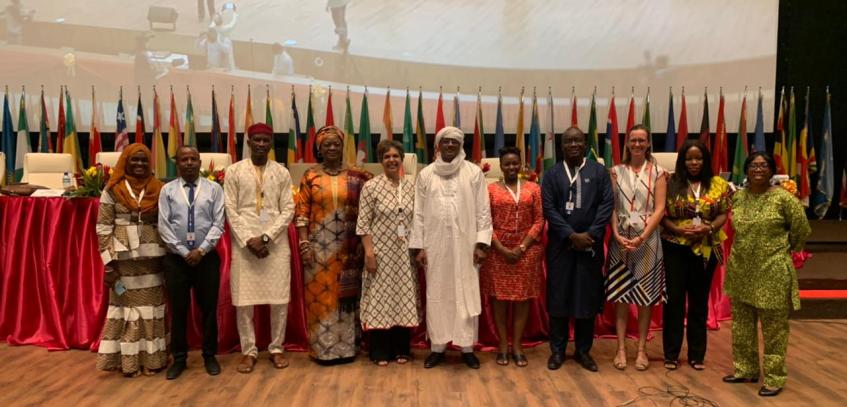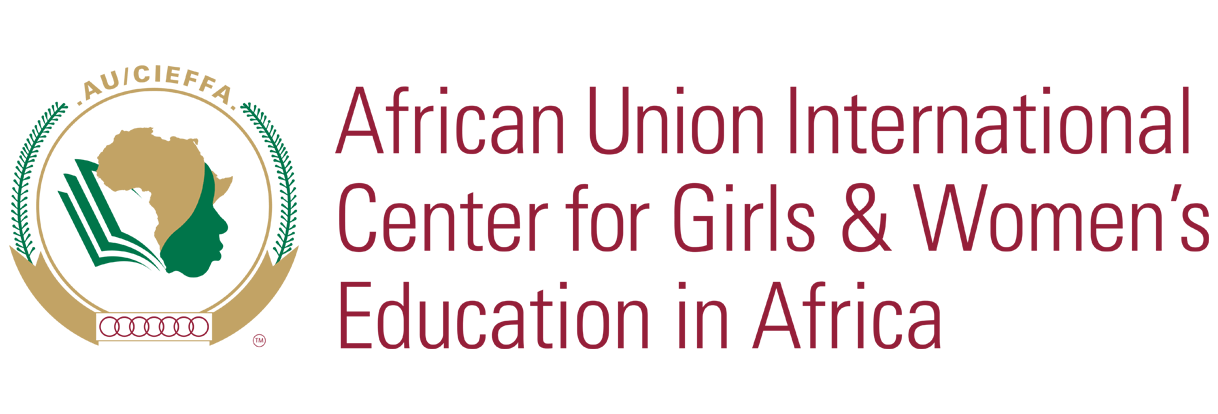On 17th November 2021, the African Union International Centre for Girls and Women’s Education in Africa (AU/CIEFFA), organized a parallel session under the theme: “Harnessing Girl’s Education for the Africa We Want” during the 3rd African Girls’ Summit, which took place at the Mahatma Gandhi Conference Centre, in Niamey, Niger.
The session was jointly hosted in partnership with UNAIDS, Girls Not Brides, the Global Partnership for Education (GPE), UNESCO, UN WOMEN, UNICEF and UNFPA.
In her opening remarks, Dr Rita Bissoonauth, Head of Mission, AU/CIEFFA, expressed her hopes that the deliberations in the session would result in better outcomes for girls in education. She called on participants to reflect on how Africa can put into action sustainable and practical investments in education for girls. She said, “One practical action for investing in education for girls would be to remove all barriers blocking girls from accessing, staying beyond primary school and achieving higher learning education, particularly, in the fields science, technology, engineering, arts and mathematics.”
Mrs Simone Yankey-Ouattara, Senior Policy Officer, AU/CIEFFA, spoke on the AU/CIEFFA Compendium on Regional and International Legal Instruments on Girls’ and Women’s Education coupled with its Monitoring Report. She explained the structure and methodology employed to design the documents as well as binding and non-binding legal instruments within Compendium. “Let us implement girls’ and women’s rights to education coupled with accountability mechanisms to guarantee advancement of girls and women at all levels”, she affirmed.
Mr Thomas Poirier, Senior Education Policy Analyst, UNESCO International Institute for Educational Planning (UNESCO IIEP) and Mundia Situmbeko, Girls Not Brides, presented key statistical evidence on gender parity in enrollment, teenage pregnancies, child marriage, gender-based stereotypes and roles in and outside of schools as well as the key underlying challenges. He stated that “Better planning and inclusive prevention mechanisms for continued education during the crisis in African Member states”,
A panel discussion including representatives of Member States, Youth and Civil Society shared lessons learnt, challenges and recommendations on important themes of legal and policy environment, innovations and strategies as well as partnerships and financing in education.
H.E. Mr Mohamed Zeidane, Secretary-General, Ministry of National Education, Niger shared on the different initiatives and policies the country is implementing to promote access to education for girls including the creation of gender units in all ministries not only in the Ministry of National Education, the adoption of a national strategy to accelerate the training of adolescent girls and young women to promote girls and women’s education (GWE) in all schools. He explained that the initiatives are operationalized at the highest political commitment level by H.E President Mohamed Bazoum and 22% of the national budget is allocated to education in Niger.
Mr Eskendir Lakew, Team Leader, Women, Children and Youth Directorate, Ministry of Education, Ethiopia, shed light on the challenges met in-country to ensure quality education for girls and women. To date, 6 million students are out of school, amongst which 3,5 million are girls. In response, he explained how the Ministry with the support from UN Women held high-level policy dialogues which led to proposals for the development of a new curriculum and gender-responsive textbooks
Ms Eline Versluys, UNGEI Secretariat shed light on UNGEI’s Gender at the Centre initiative across 8 African countries, which is essential for ensuring girls education in Africa through the Gender Responsive Education Sector Plans. She added that achieving gender equality in education across Africa requires transforming social norms through partnerships of governments, CSOs, development partners & young activists. This means believing in the abilities of girls in education “Let us not be content with increasing girls’ access and enrollment rates to school but let’s go further in making school a place of real social change to transform social norms” called Ms Eline.
Ms Janice Khumalo, AU Youth Volunteer recommended reaping the demographic divide and called for the greater implication of young innovative people, in particular, boys and girls in the planning, implementation as well as monitoring and evaluation phases of key programmatic activities and initiatives.
Mariama Gado, AU/CIEFFA Youth Alumni and a medical student from Niger, shed light on the country’s national law that stipulates that every child should be provided with an education to the furthest extent possible but is yet to be fully implemented. She also shared on instruments and laws ratified at international and local levels that address issues on the age of marriage but are yet to be harmonized. Miss Gado reiterated that “change can and will happen in the years to come as long as we (young people) are relied upon”.
Haidara Mohamed, Executive Director, Songes, Niger explained that their civil society organisation (CSO) is co-lead to the end of child marriage platform comprised 80 CSOs, Ministries of Education, United Nation agencies, Non-Governmental Organisations (NGOs) and local feminist groups to strengthen actors’ capacities to promote girls’ education at grassroots levels. Through this platform, Songes tackles gender norms, financial and violence & abuse in schools. He issued a call on all “to ensure quality and gender-responsive education for girls, create the conducing environments for girls to stay in schools, reduce violence in schools.”
In the closing remarks, Dr Sihaka Tsemo, Director, UNAIDS Liaison office to the AU and UN Economic Community of Africa, as the session moderator reminded delegates of the necessity of acting on the recommendations of the session and the importance of adopting a multi-sectorial approach, involving all state and non-state actors, to holistically tackle the complex and multifaceted nature of the harmful practices and their impact on girls’ education. She recommended collective action to face the multi-faceted challenges girls face in accessing education.
AU/CIEFFA contact
Anoziva Marindire | Information and Communications Officer | AU/CIEFFA | Email: MarindireA@africa-union.org
Ian Kaliwo | Programs Officer | AU/CIEFFA |Email: KaliwoI@africa-union.org
African Union contact
Ms Faith Adhiambo | Communications Officer-Agenda 2063 | African Union Commission | E-mail: OchiengJ@africa-union.org










